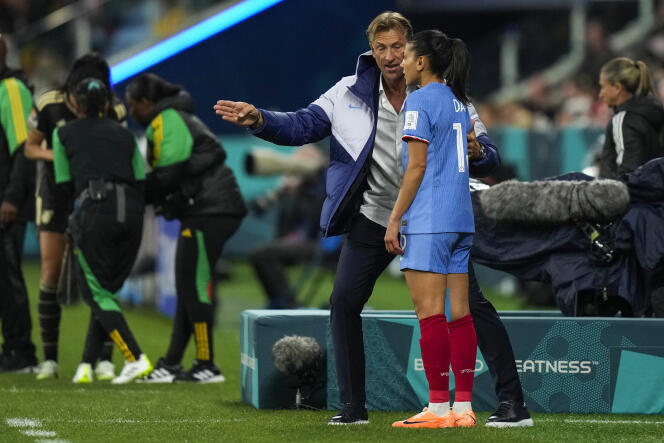


Les Bleues still haven't achieved their official goal of reaching the semi-finals, but their revival seems well underway. By appointing Hervé Renard to replace Corinne Diacre in April, the French Football Federation (FFF) was aiming for two things: to help the team reach a new level results-wise – the quarter-final against the Australians on Saturday, August 12, will be crucial in this respect – and to improve the French team's damaged image, after the controversial reign of the former coach.
With the 54-year-old Renard, the FFF seems to have hit the nail on the head. The coach appears capable of breaking the "curse" of two consecutive quarter-final eliminations at the World Cup; he is also a master communicator, able to handle both internal and external communication.
Since the dawn of the Australian tournament, Renard has been careful with his public and media statements. "We're sorry we didn't bring tea and coffee," he joked to journalists a few days before the round of 16 match against Morocco (4-0), during a windy training session in Adelaide.
And even when he's caught in the wrong, the coach's natural charm works to defuse delicate situations. A few days after seeing red in stoppage time of the crucial victory over Brazil, which earned him a yellow card, Renard had this to say, addressing the incident in response to a question about his famous dazzling white shirt: "I'm not able to coach without it. It's something I'll never talk about," he began. "I'm a bit crazy, as you saw at the end of the match against Brazil. I would like to apologize for my behavior at the end of the match. It was not good behavior and does not give a good image of French football."
In mid-May, a month before the start of World Cup preparations, Renard spoke of his spontaneity. "I'm like that, I don't force myself," he told Le Monde. "I like to communicate. I've been doing it for over 10 years. I do my job with all my heart and my passion." In Australia, every press conference turns into a Renard show, with the coach multiplying his gestures of attention, congratulating a Brazilian journalist "for the quality of [his] French," sometimes making the effort to reply in English, or sprinkling his answers with a clever "bom dia" or "gracias," when he does not master the language of the question.
The same goes for his players. "His communication is the same internally and externally," said French vice-captain Grace Geyoro. "He has the needed discourse. When he speaks, everyone listens," said defender Sakina Karchaoui. The planet saw this at the World Cup in Qatar: His tough talk to the Saudi players at half-time of a match in which they were trailing Argentina went viral, and his team went on to win the game. For Renard, these motivational speeches that coaches give their teams before or at half-time are part of his character.
You have 58.21% of this article left to read. The rest is for subscribers only.
